What US Freight Shipments and Pricing Say About the Slowdown.
Freight shipments within the US fell 3.0% in August 2019, compared to August 2018, the ninth month in a row of year-over-year declines, but it was only about half the rate of declines in May (-6.0%) and July (-5.9%), according to the Cass Freight Index for Shipments. The index tracks shipment volume by all modes of transportation – truck, rail, air, and barge – of consumer and industrial goods but not of bulk commodities. This decline was the least bad decline since March:
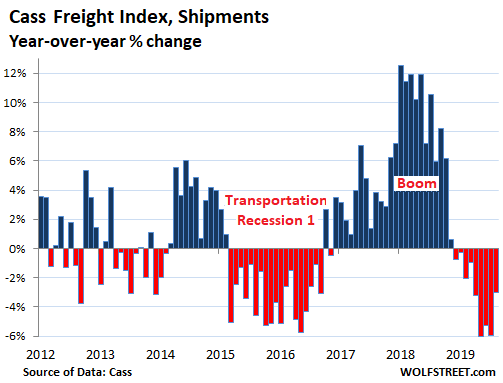
During the historic boom year in the transportation sector in 2018, the volume of shipments was far higher than in any prior year. This surge in shipments, as we now have figured out, was caused by companies, including manufacturers, trying to front-run the tariffs by ordering a lot more than they needed, hoping to lock in pre-tariff prices and filling their warehouses to the rafters with stuff.
Late last year, purchasing managers curtailed their ordering, triggering a broad slowdown in the transportation sector.
Shipments in 2019 (red line in the chart below) are solidly below 2018 (black line), but remain above all prior years, according to the Cass Freight Index for Shipments. While shipments in August 2019 were 3.0% below August 2018, they were the second highest on record for any August. The green line represents the banner year 2014:
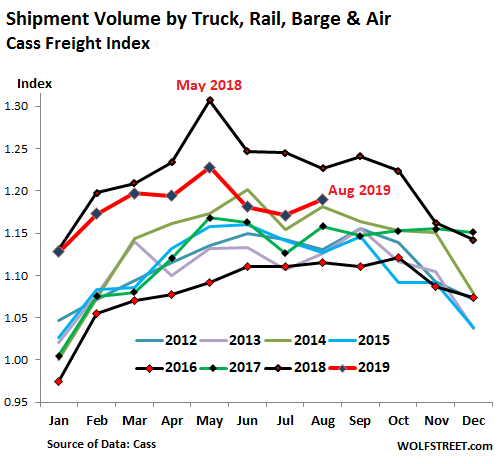
In the stacked chart above, note how in 2018, shipments fell sharply starting in October. There is nearly always a seasonal decline that time of the year, but the plunge in November 2018 was much larger than seasonality. This will make year-over-year comparisons easier later this year.
Also note that in August 2018, shipments fell from July, showing the first signs that the blistering boom was backing off. But this year, shipments in August rose from July. As a result, the year-over-year decline in July (-5.9%) was nearly cut in half in August (-3.0%).
These two factors indicate that shipments are beginning to stabilize at lower levels than last year, but at the second highest levels on record – a painful return to some kind of normal.
The index for shipments is a reflection of the goods-based economy, except commodities. The consumer – that mythic creation that lumps all members of this bifurcated economy into one bucket – is buying, and retail sales in August jumped by 4.6% year-over-year, driven by booming ecommerce sales. Whether brick-and-mortar or ecommerce sales, these goods have to be shipped.
But the industrial economy has been weak. This includes manufacturing and more broadly, industrial production. Due to the oil bust part two, there are now investment cutbacks underway in the oil-and-gas sector, a huge industry in the US, the largest oil and natural gas producer in the world. This also impacts manufacturing, such as of drilling equipment.
So what we’re seeing here is strength in shipments by the retail industry, but weakness in industrial goods, including intermediate industrial goods, such as components, that are shipped in containers to manufacturers.
In terms of railroads, the number of carloads (commodities, motor vehicles, etc.) fell 4.6% year-over-year in August, according to the Association of American Railroads (AAR). Given the oil production boom, and the lack of pipelines connecting some of the new producing regions with refineries, carloads of petroleum & petroleum products jumped 7.8%. But coal, the biggie for railroads, continued to get crushed, with carloads down 9.9% year-over-year. Excluding coal, carload traffic was down just 1.9%.
Intermodal traffic (containers hauled by truck or ship and then transferred to rail, or semi-truck trailers that piggyback on special rail cars) fell 5.4% in August. This segment is heavily impacted by competition from the trucking industry. And truck freight rates have dropped sharply from last year – which raises the appeal of shipping merchandise by truck.
In trucking, the nationwide average rate in the spot market for van loads dropped 15.4% year-over-year in August, to $1.81 per mile, according to DAT. Contract rates dropped 10% to $2.14 per mile. Flatbed spot rates fell 16.7% to $2.20 per mile. And flatbed contract rates fell 5.9% to $2.57 per mile. These declines appear to be shifting some volume from rail to trucks.
The total amount that shippers such as industrial companies, retailers, and wholesalers spent on freight by all modes of transportation fell 2.6%, according to the Cass Freight Index for Expenditures. This is a function of shipment volume, freight rates, and fuels surcharges. Despite the drop in shipments for 10 months in a row, it was only the third year-over-year decline in expenditures, as freight rates overall had continued to rise during the early phases of the shipment slowdown:
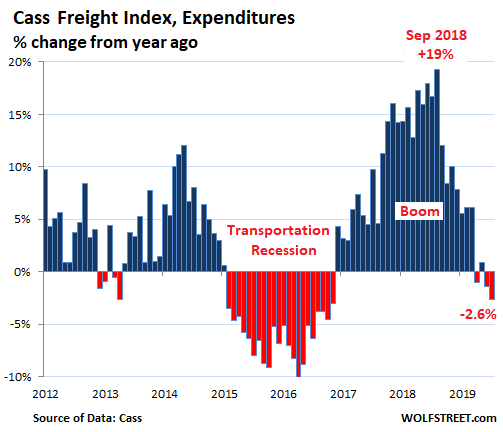
In the chart above, note the 19% year-over-year spike in expenditures in September 2018, when shippers were complaining in their earnings reports about high transportation costs and a capacity squeeze. Consequently, the year-over-year drop in expenditures for this September from the sky-high level in September last year is going to be zinger – though it will be the second highest spending for any September on record. The purple line, in third place, represents banner year 2014:
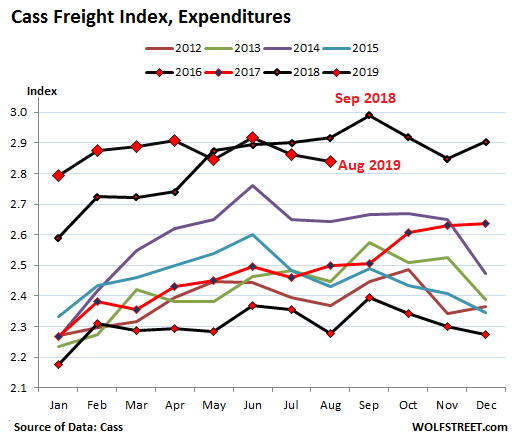
Full-truckload pricing peaked in December 2018 with a 11% year-over-year jump, but then started a relentless decline on a month-to-month basis, according to the Cass Truckload Linehaul Index, which tracks per-mile full-truckload pricing for contract and spot rates but does not include fuel or fuel surcharges. August was the first month since the end of the Transportation Recession 1 that pricing declined year-over-year (-2.6%):
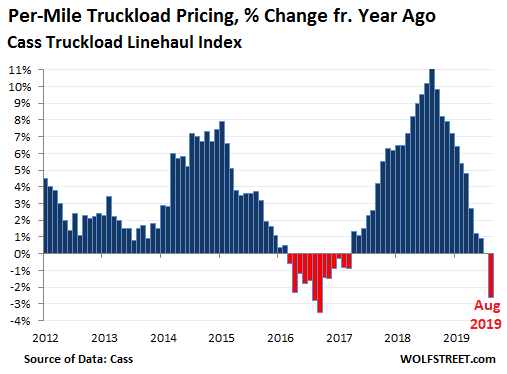
The index is down 6.5% from its peak in December, and back where it had first been in January 2018:
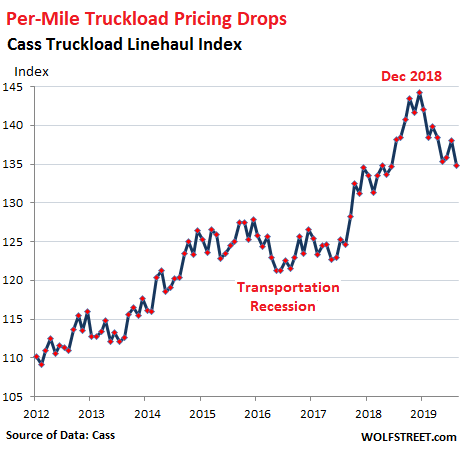
Pricing for intermodal freight has been weakening since the peak in March 2019. By August, it was down 5% from that peak, but remained up 1.2% on a year-over-year basis, according to the Cass Intermodal Price Index. Note the double-digit surges last year:
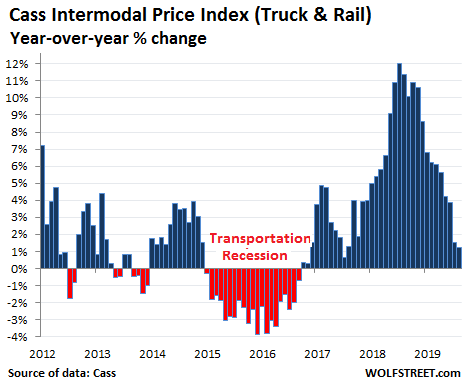
This deteriorating pricing environment produces all kinds of hardship in the trucking industry, including a flurry of closures and bankruptcies of small and regional trucking companies. But it is a godsend for shippers, such as manufacturers, wholesalers, and retailers, that had been wheezing last year, squeezed by capacity constraints and double-digit rate increases.
Enjoy reading WOLF STREET and want to support it? You can donate. I appreciate it immensely. Click on the mug to find out how:
![]()


this is shows the Krugman saying, my spending is your income and your spending is my income. factories that are not producing anything are not going to ship anything. Please the ISM manufacturing report which is at 49.01 with 50, being the dividing line of contraction and expansion
So….Amazon is happy?
“But it is a godsend for shippers, such as manufacturers, wholesalers, and retailers, that had been wheezing last year, hit by capacity constraints and double-digit rate increases.”
There is some relief for Amazon. But Amazon is starting to rely more on its own transportation infrastructure, which makes it somewhat less dependent on carriers.
“Transportation infrastructure”….
That’s a funny one, Wolf.
If you’ve gotten any Amazon deliveries from Amazon’s “Transportation Infrastructure” you know as I do it’s local home-boys taking what ever job than can.
Can we spell “Uber” and Left” with the letters A…M…A…Z…O…N?
timbers,
“If you’ve gotten any Amazon deliveries from Amazon’s “Transportation Infrastructure” you know as I do it’s local home-boys taking what ever job than can.”
Amazon runs a fleet of trucks and airplanes. It has scores of companies at its fingertips that transport and deliver. It has fulfillment centers everywhere. Some of these people are Amazon employees, some of them are gig workers on bicycles — but he only does the last mile. Some of them are small transportation companies that contract with Amazon, and they often have the Amazon logo on their shirt. It doesn’t matter who owns these companies and who pays the people — they’re all part of the Amazon fulfillment and delivery network. And that makes Amazon more and more independent of freight market pricing – through Amazon still uses all types of carriers.
auto shippers gonna be in GREAT SUPPLY til christmas
thank you autoworkers
hope they plan big ass christmas after 3 months of NON-EMPLOYMENT
Macro comment: The price of oil will rise dramatically next week due to the Houthi attack on SA (the speculators will make sure of it). The effects remain to be seen, but I expect the cost of, well, just about everything that requires transport–i.e. everything–to rise dramatically. If the ‘shortage,’ and subsequent price increases dampens enthusiasm for Christmas splurging the effects may last for months (and, obviously, the Houthis have demonstrated they can attack at will; expect the Saudis to fold sooner than they otherwise would have).
Imagine the surprise of many Americans when they discover the US isn’t ‘energy independent’ since much of the fracked oil is shipped overseas for blending with heavier oils–e.g. Venezuelan–before refining, and our refineries cannot quickly reconfigure (correct me if I’m wrong about this; I know some of the blending is done here). Maybe this explains Pompeo’s attempts to blame bogeyman Iran, before proper analysis of the attack has been performed (Disclaimer: I’m no fan of Iran, but we can’t blame our ‘ally’ SA for being at least partially responsible for this mess now, can we?).
California Bob,
WTI jumping to $70+ a barrel would be a great thing for the vast US oil-and-gas sector, and for manufacturing operations and financial services that go with it, and for well-paid employment in these sectors. It would provide a massive boost to industrial production in the US. It might even turn around the badly hit office sector in Houston (studded with nearly empty high-rises). Can’t wait for it to happen — but it might not happen because of soaring production in the US currently that will continue to put downward pressure on prices, no matter what happens in Saudi Arabia. And if $70 WTI happened, production would soar even more.
And $70+ WTI and all the activity it would create would boost trucking — needed to supply these equipment manufacturers and drilling operations.
This is not 2005 anymore. The US is the largest producer of oil and gas in the world — and production is soaring in both.
No doubt an increase in energy prices is good for this large sector (and may be salvation for shale) but net net it is negative for the economy. With the US auto sector now pretty much married to V- 8 SUVs and trucks, it is vulnerable to an oil shock.
As for transportation costs declining, it was not that long ago it was adding fuel surcharges.
If the bump is short term, perhaps not a big impact on the consumer however if ‘sustained’ :
According to the OECD Economics Department and the International Monetary Fund Research Department, a sustained $10 per barrel increase in oil prices from $25 to $35 would result in the OECD as a whole losing 0.4% of GDP in the first and second years of higher prices.
http://www.iea.org/textbase/npsum/high_oil04sum.pdf
We need to keep in mind that we have been above $25 for years now, so that has been putting enormous downwards pressure on GDP.
Which has been offset by trillions of dollars of stimulus, record low interest rates, and other central bank gimmicks.
High oil prices slowly poisons the global economy.
re: “And if $70 WTI happened, production would soar even more.”
Debatable:
“Since 2010, when the shale oil revolution really got started, the average horizontal well productivity has increased by an average of 30% through 2018, BUT oil well productivity gains have almost stopped in 2019.”
Source:
https://oilprice.com/Energy/Energy-General/Shale-Slowdown-Could-Trigger-Major-New-Oil-Price-Rally.html
Sure, $70 oil would be stimulative in some industries, but $100 bbl oil, and $8/gal, or higher gas prices will put a hurt on already stretched consumers.
We should have a winner of this ‘debate’ in a few months.
Wolf,
While true on it’s own, your statement is inconsistent with Fed Logic.
The Fed is focused on Global Economies.
If oil prices rise, Global Economies need help.
Therefore, Fed must cut rates to help Global Economies
If dat glove don’t fit, Fed must acquit.
How does the Fed help Global Economies?
Interest rate cuts, QE, NIRP.
It’s all part of the Fed’s tool box.
Dead on the money timbers.
The stimulus started around 2002 when oil prices started to creep up.
And it has never stopped. It can never stop.
Because we have used up the ‘low hanging fruit’ and now we are grasping at high cost shale and tar sands oil to feed the beast. There is no cheap oil left to find (or coal or many other resources)
The central banks absolutely understand that high oil prices are a disaster in the long run and they are doing ‘whatever it takes’ to offset their destructive impact on the economy.
The medicines that they are feeding the economy to prevent high oil prices from killing it, have horrific side effects that are slowly destroying the patient.
However to the uneducated observer, over the past 11 years the patient would appear to be some sort of freakish super-athlete, racing around the track like a mad dog.
For the educated though, it is clear that the mad dog’s dash is fueled by unnatural stimulants. And that those stimulants are going to kill the dog.
When oil prices rise to the extent that you imagine — I doubt that’s possible under current market conditions — there will be an inflation shock, and it will filter from energy segments into other segments of the economy and eventually drive up prices very broadly (see the 1970s oil shock), and the Fed and other central banks are going to get very nervous about the idea of double-digit inflation. The last thing they’re going to do is cut rates.
$147 oil in 2007 didn’t end so well.
Rat Fink,
1. It wasn’t oil that killed the economy in 2007; it was the collapse of housing and the collapse of the financial sector.
2. Like I said, this is not 2007 anymore. Back then the US was a huge net importer of petroleum and petroleum products. By next year, the US will be a net exporter of petroleum and petroleum products. In terms of natural gas, petroleum, and petroleum products combined, the US is already a net exporter. As net exporter, the US economy overall will benefit from high energy prices.
That said, I doubt that $147 a barrel is realistic, given overproduction in the US. I think the only way we’d get to $147 WTI anytime soon is if Congress outlaws fracking, which is unlikely.
You have to understand that gasoline purchases go into consumer spending and GDP; if people spend more on gasoline, it will add to GDP; many Americans will be able to do so just fine without cutting spending elsewhere, and this will be a net increase to GDP. Other Americans will have to cut back somewhere else to pay for gas, and in that case, one category of consumer spending (i.e. clothing) falls while another (fuel purchases) increases.
So these consumers will cut back on Bangladesh-made clothing, and will buy USA-made (produced and refined) gasoline. Guess which adds more to GDP?
People have trouble wrapping their heads around just how much the energy situation in the US has changed since 2007.
Once you become an oil-and-gas energy net exporter, which the US already is, high energy prices are GOOD for the economy.
Anyone else a little suspicious on how the Houthis could fly several drones over 1,000 miles and successfully strike their targets?
The event will not get by even mild conspiracy followers, since the US would prefer to close the Persian gulf at this point. Wolf aptly points out that the US is an energy exporting nation, maybe its most viable jobs industry as well. China is clearly not going to respect US sanctions on Iranian oil. Economic slowdown, oil embargo, or shock, president under indictment, retreat from Saigon (Kabul), looks more like “That 70’s” show all the time.
There are at least 2 large oil exporting vessels and maybe more ( Iranian) parked right outside Chinese ports, ready to unload their cargo ( sea- transfer style)! So respect for the US?! NO.
There is also the theory going around now ( with some credibility!!) that the Boltonnite hawks wing of the US administration have more than a finger in this “ swarm of drones” !!
Attack on the Saudi oil installations.
The positive points for the US from the point of view of the hawks?
– when things get stagnant ( better reshuffle the cards)! You never know you might get a better hand! No one wants to operate Lonely ( pompeo the pompous war monger is No exception)!
– creating a messy situation for the President of the United States is an ongoing endeavor by the like minded of discarded Bolton the lightning bolt , or the discarded bolt) choose your pick!
– the damaged Saudi facilities are extremely profitable repair opportunity for the ( largely US maintenance and spare part oil industry) … that goes very well with keeping everyone employed and earnings their honest dollar!
– you might also want to add here Wolf’s expectations of a brighter outlook for the shale shills of any disruptions to the oil supplies.
As one of the commentators suggest here (if Epstein the dead acrobat can strangle himself with hodini style act) everything is possible!!
Think about this , just when the Japanese prime minister visits Iran for talks to reduce tensions in the region ( Iranian scoundrels blow up few mines and damage some Japanese ships)!
Just when the US President shows some signs of going down the path of negotiations with those ( scoundrels) ..,YUP you guessed it ( the hotties and Iranians) attack ( our allies)!
Talk about coincidences?!
Remember the Bear’s words?
“ it’s too coincidental to be a coincident”!!!
If Epstein can strangle himself while sitting on his knees, I guess anything is possible.
Makes for good conversation in the office. And for an encore, take a poll of how many know that 3 office towers went down on 9/11. You’ll be met with confused looks. Be sure you’re okay with being a black sheep before you ask though though!
Man, I don’t know what is with me double-typing words! Maybe my tin foil hat is cutting off circulation to my brain.
I have been pondering that myself. Rather hard to believe.
$70 oil would stop the shale patch from bleeding out.
The timing is absolutely immaculate!
https://srsroccoreport.com/shale-stock-carnage-august-was-a-bad-month-for-frackers/
I wonder why the US imports 3.5 million barrels of crude from Canada, every day? Hmmmm. The answer is refining. Currently, product and holes in the ground supposedly = energy independence for the USA. However, due to refining requirements and specialized products the US imports…still imports 9 million barrels per day. It is actually the largest importer of petroleum in the World. LARGEST.
The meme of Energy Independence is a political red herring. Take Canada, for instance. Canada actually produces +200% of the oil it uses. However, due to a variety of issues it still imports finished product and even feedstock. It imports saudi oil…to the east coast. It imports finished product from American refineries, even though it sells to the US more than it uses each and every day.
The Energy Industry runs like a finely tuned watch. It is quite amazing, really. Even a 1-2% over-production sends prices plummeting. The current Saudi disruption takes 5% production off the Global market. 5%. Yes, there are reserves in place to hide this for awhile. Production elsewhere could be increased, but there is a lag time. The current disruption is on the scale of the ’73 oil embargo and I’m old enough to remember the gas lines and even/odd day buying restrictions. This was caused not by a lack of prodect, per se, but rather by fear.
A 5% supply disruption cannot simply be shrugged off. If it lasts, look for much higher prices. If retaliation against Iran happens, all bets are off. The US is part of the World Energy Market and with its transportation reliance on automobiles and trucking, it will suffer greatly with a spike in layoffs. This is a wakeup call and maybe exposes just one consequence of poor foreign policies for the sake of political posturing.
Warren Buffett bought out one of the largest truck carriers a long time ago. If you look at his annual report you can see it is a horrible business. But it squeaks a little profit out so his policy is to acknowledge you made a mistake. I think owning the trucking company made him realize that the rails are a near monopoly and if you have a friendly regulator it’s a money maker. BFN has been a good investment because he bought it in the middle of a recession for around a PE= 15. If you are buying something to keep you really need to limit what you pay to high teens as far as PE.
Old-school,
I don’t remember what trucking company Buffet bought. I know he recently bought a big stake in the truck-stop chain Pilot Flying J. And before the Financial Crisis he bought a railroad, BNSF. So jog my memory about the trucking company he owns.
Xtra Lease.
Berkshire Hathaway bought mclane from wal mart
Berkshire also owns xtra
The company is McLane. 50 Billion revenue and 250 million profit. If I am not mistaken McLane has no debt. Thats one thing I like about brk is all of his operating companies operate with nearly no debt except railroad and itility operations.
I used to be a brk shareholder and read annual report every few months. Its very readable. I will probably buy again if it gets cheap enough.
Higher fuel costs don’t help me as a consumer.
The workers that are employed by the energy
sector or indirectly by the energy sector will
benefit. Good for them, but most Americans
will have to reduce spending in other areas to compensate for higher energy costs. The pie
isn’t getting bigger for most.
Sporkfed,
But for the economy as measured by GDP, it is better when you cut $100 from spending on clothes and other things made in China and increase by $100 your spending on gasoline produced and refined in the USA. Both clothes and gasoline sales add to GDP, but clothes are imported and the costs of imports are subtracted from GDP. Gasoline on the other hand is a US-made product.
2018 boom = front-running tariffs. This is the hangover.
Whatever happened to “just in time” shipping, and those RFIDs which allow Walmart to track all it’e inventory (even after you take it home). For their part China will continue to provide low cost goods no matter what the global slowdown looks like. The ECB may ride to the rescue, or at least some of them. The next big thing is getting some of these EMs to go more vertical with their economies, China has already taken the lead. In their new strategic agreement with Iran they propose offshoring their manufacturing business.
Just wondering if all the media talk about a looming recession by the media during June affected the minds of shoppers to be prepared, and people bought more stuff; analogous to the commercial entities doing the same to beat the tariffs in 2018. Pure conjecture, and not scientific, but makes you wonder why the bump up in June.
Tariffs will add to consumer price increases. Fracking will spread across the globe. Sea levels will rise.
I suppose trucking volumes are cyclical.
Too much violence in the Persian Gulf. Much jihad is not good for prosperity. What happened to love your neighbor as yourself?
Krugman is correct in theory but wrong in reality. My spending is your income and your spending is my income only works in a closed system. We have too many leaks where my income goes out of the country into foreign economies which buy very few real goods and balance their trade by buying our financial instruments which help the bubble economy ,and the 1%, but has hollowed out the middle class and created a contracting real economy.
Bingo.
Right now my spending is Amazon or Walmart income. Their spending certainly is not my income.
When I grew up in a small town Post Walmart and Amazon, yes, Krugman was correct.
He only won the Nobel Prize in economics and did not share it like other winners. Please do have a Phd in economics and win a Nobel prize in economics and then you are welcome to contradict him.
ooe, are you suggesting that, in order to argue against a dogmatic school of thought based on false assumptions that fly in the face of the laws of physics, we need to become similarly indoctrinated into the dogma to the extent that its high priests give us awards for parroting it with some slightly novel slant?
Economics is a political science, and its principal protagonists will therefore be those who broadly represent whatever sort of view is most politically edible. And, just like in politics, people representing e.g. views that argue for contraction and preservation, based on the real existence of limits and diminishing returns, are unlikely to gain significant recognition or advancement. (I guess it’s too late for that now, anyway, since we blew through our limits a long time ago.)
I hear those morons gave Obama a peace prize … and anyways, what is economics but a “science” without controls, i.e. not truly repeatable.
Right on Saltcreep and ZeroBrain.
Nothing but scorn for Krugman.
Nobel, Schnobel.
What a joke.
Was the Nobel Prize for short-term thinking?
I think there is a joke that economist theories only work on a secluded island when there are no more than 3 people.
1) China is ARAMCO largest customer. ARAMCO IPO will skip HK.
2) Tariff by US, China biggest customer, and higher energy
cost will accelerate Chinese economy decline.
4) HK central bank HKMA will cont to devalue the HK dollar.
5) PBOC & HKMA are the same gang.
6) The HK dollar will become worthless, or disappear. HK trading facility and stock exchange might shut the doors.
7) China elite used HKMA to launder money, but US co are locked in.
8) AAPL + GM cannot send money back home. A similar situation
have happened in Germany in the late 1930’s. You can get in, but cannot get out. US co investing in Germany that helped Nazi Germany grow,
all they could do was to circulate within, grow inside Germany.
9) Higher oil is good for the energy sector, but bad for China.
10) Further weakness in the Chinese economy, – that must grow
in exponential increments, – might blowup the fake Chinese economy,
built on printing RMB, sending the global GDP into a tailspin.
China waved soybean & pork tariffs. Armed or not…do not want starving peasants. Their will be no trade deal.
Next will be UK. If they leave EU, Trump & Boris will have a deal in waiting.
EU will then be in cross hairs. Trump will give them a way out….as long as it all goes through the UK.
Tune out msm & wall street noise, and its quite the chess game going on.
China is buying Iranian oil at a fraction of market price!
The Iranians cannot afford to stop pumping oil from many wells due largely to the dangers of ( losing pressure, once you lose pressure in a productive well it becomes more difficult to bring it online again) and here I ask ( any experts on this field to please correct me).
Another problem is if they lose markets it will be very hard to regain those markets.
So , as the US gets busy with its sanctions against the like of Venezuela and Iran , the communists Chinese have figured out that this could be great opportunity to grab ( CHEAP OIL) and sustain albeit a slower economy.
Yes that’s how the unforeseen consequences occur, the path to hell is littered with great good chunks of good intentions!
Conclusion: the energy cost to the Chinese is well under control!
Please keep those sanctions going on :)
Due to the dollar sanctions, the Iranian’s will only be able to spend the offshore yuan they receive for their exported oil in one major market: China. It won’t help their dollar starved economy very much but I’m sure the ayatollahs all need a new Huawei 5G phone.
Cesqy,
I don’t think they’re interested in dollars now! Though that’s debatable!
The Iranian Economy have grown at a reasonable pace( though could’ve done exponentially better) even with sanctions.
Iran have skirted lots of harm from lack of currency with special deals with Erdogan the Ottoman Emperor! and the Shiite dominated Iraqi Government!
The Mullahs’s regime have largely kept the population under control due to these sanctions!!
When your basic message is that great SATAN is impoverishing us is drummed into your soul every day you’ll be hardly pressed to find an alternative more convincing argument!
The POTUS have come to realize this of late, he knows very well that bringing Tehran to the Sphere of the United States will prevent THE COMMUNIST from winning the Trade war largely due to the strength that would add to US economy.
That being said, there is a horde of imbeciles sitting behind him in Washington ( beating the Drums of hostilities)!
Funny that those same imbeciles don’t read their own history!
Who was it that said “ If the US had paid China to invade Afghanistan a Trillion dollar, we would’ve come as winners “ or something to that effect.
Once those sqwak squad are tempered and reason reigns, there could be huge positives for the US Economy and the world at large.
Will that happen?!
That’s entirely different story!
jack If you export oil…Iran or Saudi Arabia, you’re interested in dollar transactions.
By the way, and speaking of BNSF, for those for whom “intermodal” is just an abstraction, you might want to visit to one of those railfan webcam sites and see exactly what’s involved in humping FedEx, Walmart, etc. cross-country: mile-long “Z” trains at 70mph or, if you prefer, a “16k” (as in 16k feet long): 10 engines, 280+ trailers, 40,000 horsepower. It’s quite a sight, and quite an operation.
Not sure why UAW would go on strike heading into a recession (Oh wait go on strike now or get laid off in a month?) My brokerage analyst is calling it an earnings recession. Says the media has missed it entirely. I like that concept anyway.
I learned a lot from reading Hussman. (Hope he knows what he is talking about). Two are:
Government deficit ends up as business profits and
Wage growth and corporate profits are inversely related. We went through much of this decade with corporate profits at high levels of 10% and wages stagnant. Trend has been reversing lately.
Corporate profits are supposed to be one of the most mean reverting things in economics. I think they cycle between 5% and 10% over decades. You can imagine stock market level if profits drop to 5% of sales instead of 10%.
As terrible as pricing has been for truckers, the spot rate decline appears to be getting less bad according to the DAT dry van data. Hardly bullish but perhaps a sign of bottoming? If so, TL stocks should reflect a recovery soon.